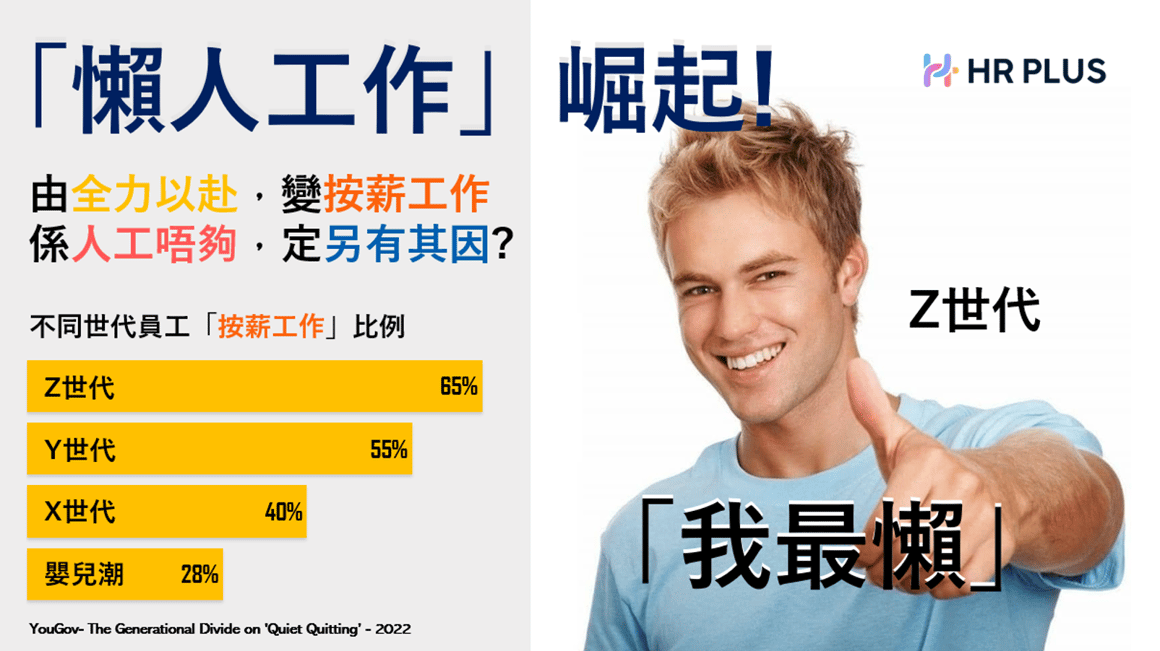[ Z世代 ] 「我就懶」工作文化崛起! 由全力以赴,變按薪工作,係人工唔夠,定另有其因?

近來「懶人工作」(Lazy Girl Job) 一詞在社交媒體上愈發流行,並在TikTok上觀看次數超過1800萬次。「懶人工作」鼓勵 Z世代人才選擇非傳統職業道路,專注於按薪工作,完成最低基本工作要求,而非全力以赴。如同「安靜辭職」一樣,這些趨勢均讓HR對如何吸引和留住Z世代人才,感到焦頭爛額。亦令我們不禁思考:背後有什麼原因驅使「懶人工作」崛起?
🌟懶人工作=安靜辭職💼
「懶人工作」實際上是「安靜辭職」趨勢的延伸。COVID-19疫情對很多人才的價值觀都產生了巨大改變。在傳統的5天辦公室工作轉向混合工作下,不少員工證明了在保持工作靈活性的同時仍然能夠完成工作,並有更多時間思考工作以外的人生。不少打工仔亦意識到生活成功不僅僅是事業成就。
🌟價值觀轉變 — Z世代不再以工作成就定義人生成功🥇
Deloitte 對千禧一代和Z世代的 2023 調查中,發現了有趣的變化。雖然62%的千禧一代仍然將事業成就視為人生成功,但只有49%的Z世代認同此看法。這顯示Z世代不再認為事業是人生的首要事項,並把更多精力注重工作和生活之間的平衡,擴展自己的社交圈子和探索其他愛好或兼職工作的機會。
🌟Z世代看重工作與生活平衡勝於薪酬💸
哪麼,如果企業以提高薪酬來激勵Z世代努力工作是否明智?UKG Workplace Institute 的一項調查顯示這未必有效。大約70%的Z世代員工表示,如果可以換來更好的工作與生活平衡,他們願意在下一份工作中接受減薪5-10%。這表明Z世代希望雇主專注於改善工作健康,而不僅僅是提供高薪酬以激勵工作。
🌟面對「懶人工作」的情況,企業是否應該采取行動,或按兵不動?🛑
儘管「拒絕全力以赴」在企業文化中通常被視為「懶惰」,我們也應該考慮以住「全力以赴」相關的隱藏成本。「全力以赴」的工作文化要求員工不斷超越自己,一直是工作倦怠(Burnout)的主要原因之一。而工作倦怠住住會導致生產力大幅下降,員工離心,並在團隊中傳播消極情緒。Deloitte 在調查中顯示:超過一半(52%)的Z世代員工長期感到倦怠,進而導致績效下降,討厭公司等負面結果。企業若通過一定程度上接受「懶人工作」成為在工作文化的一部份,鼓勵員工在工作與生活上取得平衡,並減少倦怠引起的不良影響,從而最終使員工和團隊整體受益。
___________________________________________________________________________________________________________________
"The Rise of the 'Lazy Girl Job': Why more Gen Z opt for Minimum Work??
The term 'lazy girl job' has gained popularity on social media lately. With over 18 million views on TikTok, it's encouraging young workers to choose non-traditional career paths, where they focus on meeting the basic work requirements instead of going the extra mile. Similar to the concept of 'quiet quitting,' these trends might worry HR about engaging and retaining their younger workforce. It leads us to wonder: What's driving these changes?"
🌟Lazy girl job = Quiet quitting💼
"Lazy girl job" is essentially an extension of the trend known as “Quiet Quitting” that has continued after the pandemic. The COVID-19 pandemic caused a big change in what workers value. Traditional office jobs shifted to remote work, proving that it's possible to be flexible in how we work while still getting things done. Now that employees have experienced this new way of working, they're realizing that there's more to life than just succeeding in their careers.
🌟Shifting Work Values - Gen Z's Changing Perspective on Work🥇
In the 2023 Deloitte Survey about Millennials and Gen Z, there's an interesting change. While 62% of Millennials still strongly connect their identity with their work, only 49% of Gen Zs feel the same way. This shows that Gen Zs don't see their careers as the most important thing anymore. Instead of just focusing on career success, Gen Z value having a good balance between work and personal life. They prioritize having time for friends and being able to explore hobbies or side jobs.
🌟Changing Priorities: Gen Z Values Work-Life Balance over Pay💸
Is offering higher pay to motivate Gen Z to work harder a good idea? A study by the UKG Workplace Institute indicates that it might not be the best approach. About 70% of Gen Z employees shared that they would be okay with accepting a pay cut of 5-10% in their next job if it meant having a better work-life balance. This suggests that Gen Z is encouraging employers to focus on creating a healthy work environment rather than just pushing for intense performance and high pay in job offers.
🌟Can employers fix “the lazy girl job”? Or should we? 🛑
While not “going above and beyond” might be seen as "laziness" in the workplace, we should also examine the hidden costs associated with this perspective. The prevalent hustle culture, which demands employees to go above and beyond, has emerged as a key contributor to workplace burnout. This burnout results in reduced productivity, disengagement among employees, and the spread of negativity within the team. A survey conducted by Deloitte suggests a concerning statistic: more than half (52%) of Gen Z workers experience ongoing burnout, which subsequently leads to decreased performance, cynicism, and other negative outcomes.
In embracing the concept of the "lazy girl job" within our culture, employers can foster an environment that encourages work-life balance and minimizes the detrimental effects of burnout, ultimately benefiting both employees and the organization as a whole.
